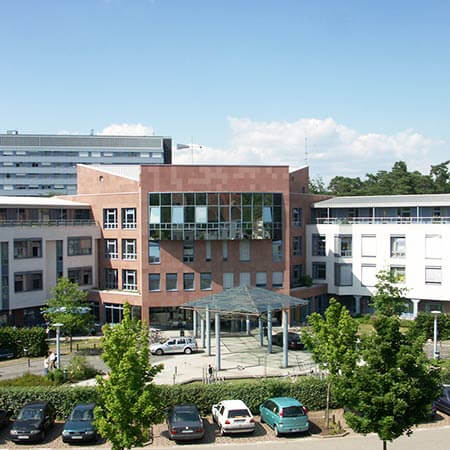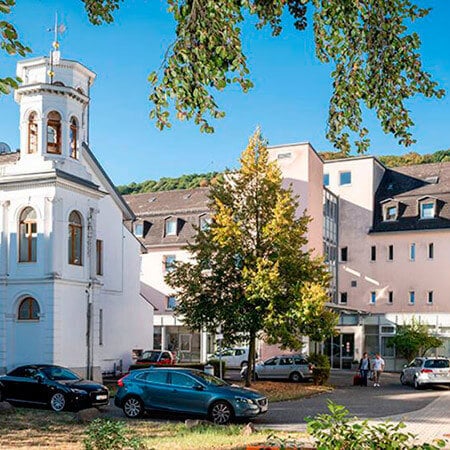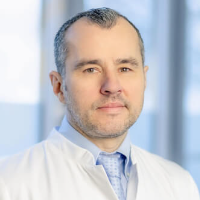Venous Malformation — Venous Embolization: treatment in the Best Hospitals in the World
Treatment prices are regulated by national law of the corresponding countries, but can also include additional hospital coefficients. In order to receive the individual cost calculation, please send us the request and medical records.

Department of Interventional Neuroradiology
The Department of Interventional Neuroradiology offers the full range of services in the areas of its specialization. The medical facility provides imaging diagnostics and low-traumatic image-guided interventional treatment of nervous system diseases. The department's specialists have rich experience and exceptional professional skills in the field of interventional procedures for acute and chronic vascular diseases, such as ischemic strokes, brain hemorrhages, cerebral artery stenosis, brain aneurysms, and vascular malformations. The department's neuroradiologists cooperate closely with neurologists and neurosurgeons so that each patient receives an optimal treatment regimen based on the expert opinions of the specialists. The department's medical team has state-of-the-art computed tomography (CT), magnetic resonance imaging (MRI), and MR angiography systems that are actively used for diagnosing patients and therapeutic procedures. Medical care is provided in compliance with current clinical protocols. The department also offers many outpatient medical services, which is an advantage for many patients.




Department of Interventional Radiology
The Department of Interventional Radiology offers the full range of modern diagnostic procedures using ionizing radiation, image-guided tissue sampling (biopsy), and minimally invasive therapeutic procedures. Patients may be seen on an inpatient or outpatient basis. To achieve optimal results, the department works closely with specialists in radiation therapy, oncology, neurology, neurosurgery and neuro-oncology, as well as urology, orthopedics, pain management, and palliative care. This collaboration helps ensure an accurate diagnosis and the most effective treatment.





Department of Diagnostic and Interventional Radiology, Nuclear Medicine
The Department of Diagnostic and Interventional Radiology, Nuclear Medicine offers the full range of diagnostic and therapeutic procedures in the areas of its specialization. The department has high-tech equipment for all types of modern imaging tests, image-guided therapeutic procedures, as well as radioisotope examinations and treatment of thyroid diseases using radioiodine therapy. The patients are provided with both inpatient and outpatient medical care. However, hospitalization is usually required only in the case of complex therapeutic interventions. The patients' health is in the good hands of the highly qualified doctors. The specialists regularly undergo advanced training courses, attend medical congresses and symposia, where they find out about innovations in the area of their specialization and share their experience with colleagues. To provide maximum safety for patients, the department strictly adheres to radiation protection standards.




The problem of treatment of patients with venous malformations is one of the challenging tasks of clinical practice. Its significance is determined by the danger of developing extremely severe complications, i.e. trophic disorders, ulcers, bleeding from angiomatous tissues, progression of venous insufficiency, etc.
Overview
Venous malformations arise against the background of abnormal veins development. The venous malformation is one of the most common vascular malformations. The venous malformation is characterized by abnormal development and pathological enlargement of superficial or deep veins. Usually, the venous malformation has abnormalities in the structure of a vein. Blood from organs and tissues flows through the veins. Veins with congenital structural anomalies cannot cope with this function. A venous malformation looks like a plexus of bluish vessels that are visible under the skin, and sometimes like varicose veins.
Venous malformations vary in size and location. They can be superficial, deep, or isolated, and affect different parts of the body. They can be confined to one specific area or spread out. Venous malformations usually cause discoloration. Their color depends on the depth and volume of the affected vessels. The closer the affected vessels are to the skin surface, the more intense the color is (from dark blue or burgundy red to bluish).
The blood in venous malformations circulates very slowly, causing blood clots to form. When venous malformations are filled with blood, and the blood remains in the abnormal veins, it causes swelling. They can expand due to age, injury, puberty, or pregnancy, and they may contain blood clots that makes it difficult for blood to reach the area around the venous malformations.
It is a congenital abnormality, although clinically it can manifest itself in early childhood, adolescence, or even adulthood. Venous malformations can appear on any part of the body, including skin, muscles, bones, and internal organs.
The disease is most common in female patients. The most common localization of the disease is head and neck – 18,2% of cases; upper limbs – 20,9% of cases; lower limbs – 46,4% of cases; trunk – 4,5% of cases; pelvis, external genitalia – 1,8% of cases; mixed localization – 8,2% of cases.
Symptoms
The symptoms of venous malformations can vary. Depending on its size and location, venous malformation can cause the following symptoms:
- Feeling of heaviness in the affected area
- Acute pain, which is a manifestation of thrombophlebitis in the area of venous malformation
- Hardening of the area or soreness when touched
Varicose veins occur in less than half of patients (32,7%), with localization of the process on the lower extremities in 47,1%. This symptom is typical for complex and extensive pathological processes; less often it is detected in local venous-cavernous lesions.
Trophic disorders in venous malformation develop in 33-36,4% of cases, including open trophic ulcers. In 6,4% of cases a history of bleeding is present, the source of which is venous cavities with thinned skin above them.
The venous malformation can be accompanied by dysfunction of the upper or lower limbs, as well as by poor vascularization of bone structures.
Venous hardening (phleboliths) of the affected area is sometimes detected (in case of damage to the upper and lower extremities). Angiomatosis is noted in about 24,5% of patients. The most distinctive sign of this form is the presence of visible venous nodes with a bluish tinge, that are protruding above the skin surface. It is present in about 61,8% of patients.
Complications of venous malformation depend on the depth and extent of the lesion and can manifest as swelling and soreness in the affected area; varicose veins; bleeding disorders; thrombosis and thrombophlebitis development.
Diagnostics
Like with other vascular anomalies, the diagnosis of venous malformation is made based on a carefully collected anamnesis, physical examination, and instrumental diagnostic methods, i.e. ultrasound scanning, CT scan, MRI, and angiography (X-ray of blood vessels). If the gastrointestinal tract is affected, endoscopic diagnostic methods are used.
Ultrasound methods remain the leading ones in the examination of patients with venous malformations due to their simplicity, safety, and the possibility of performing the procedure repeatedly. In the diagnosis of venous malformation ultrasound shows:
- Atypical anatomical structure of the venous system
- Increase in the diameter of deep veins, valvular insufficiency of deep, superficial, and perforating veins in the absence of significant changes in blood flow through vessels
- Increase in volumetric blood flow rate in lesions in the veins of the proximal limb segment and the veins of distal localization
- Presence of thrombotic masses and phleboliths, which indicates the previous thrombosis
Computed tomography in venous malformation diagnostics provides a doctor with a more detailed visual assessment of the extent of the lesion. Dynamic contrast enhancement allows doctors to get a clearer computed tomographic picture by increasing the density gradient of pathological vessels and surrounding tissues. This diagnostic method can differentiate various anatomical structures. Computed tomography is also good in terms of assessing phleboliths, which is a distinctive computed tomographic sign of venous malformation of arteriovenous forms.
In magnetic resonance imaging (MRI), pathological vascular formations look like numerous rounded foci. At the same time, with MRI, a lot of soft tissue nodes with an inhomogeneous bright MR signal are noted. The foci of an increased signal in case of muscle damage look like rounded formations with rather clear contours, which in places merge to form specific structures. These changes correspond to vascular cavities and vessels with a low-velocity characteristic and are a hallmark of venous malformation.
Embolization
Embolization is a minimally invasive endovascular surgery in which veins and arteries are selectively blocked with special medications. Doctors use it to stop bleeding and cut the blood flow to the tumors. The tumor then stops growing and shrinks, until it disappears completely.
General indications for embolization minimally invasive surgery include:
- Various bleeding
- Uterine fibroids
- Varicocele
- Preparation for myomectomy
- Conditions requiring isolation of a separate section of the bloodstream from the general blood supply
- Growing inoperable tumor
The main contraindications for embolization include:
- Intolerance to contrast medium
- Pregnancy
- Acute inflammatory processes
- Blood clotting disorders
- Poor permeability of the vessels of the small pelvis
- Some types of fibroids
- Malignant neoplasms in the uterus and ovaries
Vein embolization is the procedure for blocking the veins with special substances or materials. The technique belongs to the category of minimally invasive surgical procedures that are carried out under X-ray control.
A vein embolization procedure is a universal method that includes vein embolization of the prostate, liver, uterus, and other organs. Vein embolization is used for the prevention of recurrence of venous malformations and stimulation of tissue growth to replace the lost tissue mass. Vein embolization offers the prevention of benign neoplasms, although there is evidence of good results in the treatment of malignant tumors as well.
How is vein embolization performed?
Before vein embolization, it is necessary to undergo a standard preoperative examination. It is also necessary to consult a cardiovascular surgeon before the procedure. If indicated, other diagnostic methods of research can be prescribed.
Vein embolization is performed in the operating room equipped with the angiography device and other interventional radiological equipment. For visual control, a contrast agent is injected intravenously.
The special catheter is then inserted inside the vein. A doctor moves it along the vessels until the catheter reaches the desired location. After that, the doctor makes an injection of a special drug that blocks the blood flow in the vessel. The blood supply is controlled with the help of angiograms. The veins supplying the healthy part of the organ are not affected. Most often, vein embolization is performed under local anesthesia and takes about 30-60 minutes.
During vein embolization, a special equipment is used for a surgical procedure, with minimal or no anesthesia at all. In some cases, vein embolization is performed under general anesthesia – for example, with portal vein embolization. In vein embolization, special coils or gelatin sponge are used.
The properties of the gelatin sponge allow doctors to perform a temporary vein embolization. The sponge consists of insoluble gelatin. It absorbs the liquid, swells, and clogs the vessel. Polyvinyl alcohol particles are used for permanent embolization – it consists of very small balls that clog the desired vessel. One of the best materials for embolization is acrylic-gelatin microspheres – particles with an ideal spherical surface.
The embolus is pushed into the target area. Then a control X-ray is performed to determine if the procedure was made correctly (for example, in vein embolization of the uterine).
Since vein embolization is a minimally invasive surgery that does not require skin incisions and suturing, the rehabilitation period is minimal. Usually, the patient spends just several days in the hospital under the supervision of doctors. It is necessary to limit the stress on the cardiovascular system for several months after vein embolization.
Where can I undergo vein embolization abroad?
Health tourism is becoming more and more popular these days, as medicine abroad often ensures a much better quality of vein embolization.
The following hospitals show the best success rates in vein embolization:
- University Hospital Saarland Homburg, Germany
- Memorial Bahcelievler Hospital Istanbul, Turkey
- University Hospital Halle, Germany
- University Hospital Muenster, Germany
- University Hospital Oldenburg, Germany
You can find more information about the hospitals on the Booking Health website.
The cost of treatment abroad
The prices in hospitals listed on the Booking Health website are relatively low. With Booking Health, you can undergo vein embolization at an affordable price.
The cost of treatment varies, as the price depends on the hospital, the specifics of the disease, and the complexity of its treatment.
The cost of treatment of vein embolization in Germany is 16,203-33,997 EUR.
The cost of treatment of vein embolization in Turkey is 13,977-14,433 EUR.
You might want to consider the cost of possible additional procedures and follow-up care. Therefore, the ultimate cost of treatment may differ from the initial price.
To make sure that the overall cost of treatment is suitable for you, contact us by leaving the request on the Booking Health website.
How can I undergo vein embolization abroad?
It is not easy to self-organize any treatment abroad. It requires certain knowledge and expertise. Thus, it is safer, easier, and less stressful to use the services of a medical tourism agency.
As the largest and most transparent medical tourism agency in the world, Booking Health has up-to-date information about vein embolization in the best hospitals. We will help you select the right clinic taking into account your wishes for treatment.
We want to help you and take on all the troubles. You can be free of unnecessary stress, while Booking Health takes care of all organizational issues regarding the treatment. Our services are aimed at undergoing vein embolization safely and successfully.
Medical tourism can be easy! All you need to do is to leave a request on the Booking Health website, and our manager will contact you shortly.

